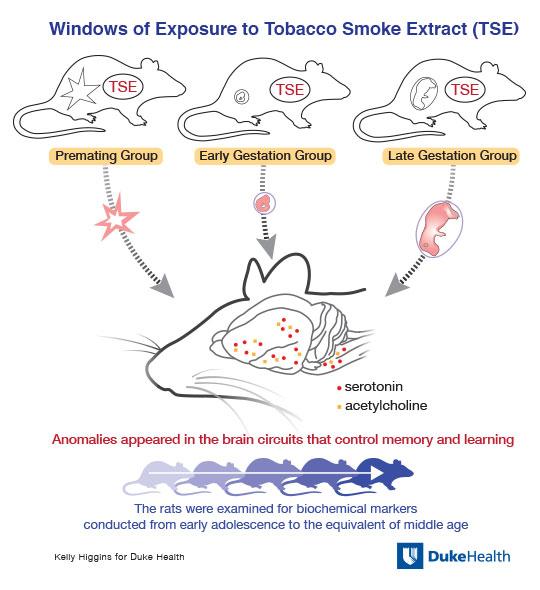
Credit: Kelly Higgins for Duke Health
DURHAM, N.C. — Exposure to second-hand tobacco smoke — even before conception — appears to have a lingering impact that can later impair the brain development of a fetus, researchers at Duke Health report.
Using rats in experiments carefully designed to mimic the second-hand smoke exposures that humans encounter, the researchers found that the chemical components of tobacco smoke affect fetal brain development throughout pregnancy.
The smoke exposure damages regions of the brain involved in learning, memory and emotional responses. Although the impact was most severe with exposures occurring in late gestation, adverse effects on the fetuses' neuro-development occurred even when the mothers were only exposed prior to conception.
"This finding has important implications for public health, because it reinforces the need to avoid secondhand smoke exposure not only during pregnancy, but also in the period prior to conception, or generally for women of childbearing age," said Theodore A. Slotkin, Ph.D., professor in Duke's Department Pharmacology & Cancer Biology.
Slotkin and colleagues, publishing in the January issue of the journal Toxicological Sciences, simulated secondhand smoke exposure by capturing and extracting the chemical compounds of tobacco smoke and administering the solution through implanted pumps in the laboratory animals.
That process eliminated the stress of breathing smoke, which in itself can potentially impact fetal brain development — a factor that had confounded earlier studies on the effects of tobacco smoke.
Groups of female rats received the tobacco smoke extract during one of three periods: prior to mating, early gestation or late gestation. The researchers then studied the offspring starting in early adolescence and into adulthood, focusing on brain regions that are known to be adversely affected by nicotine and tobacco smoke.
The researchers found that exposure to tobacco smoke extract in all three of the study periods resulted in the offspring having impaired function of the cholinergic brain circuits that govern learning and memory, and of the serotonin circuits that affect mood and emotional behavior.
It is not known how the smoke exposure damages fetal brain development prior to pregnancy. The researchers said more study is needed, but potential causes include the lingering effects of some of the smoke components, which can remain in the body for several days after exposure. They also suggested that the chemicals might change the mother rat's metabolism or hormonal status, or they could be causing an epigenetic alteration in the egg, which affects the activity of genes that control brain function.
"Our study clearly shows there is no stage in which tobacco smoke is innocuous to the developing fetus," Slotkin said. "We warn women about smoking during pregnancy, and most people are aware that secondhand smoke exposure is also harmful to the fetus, but our study is the first to show that exposure prior to conception is potentially damaging, as well. The public health implications should be obvious."
A prior study from the same team found a substantial portion of the tobacco smoke effect resulted from the nicotine in the smoke. That finding suggests that e-cigarettes could also represent a significant hazard for women of childbearing age.
###
In addition to Slotkin, study authors include Ashley Stadler, Samantha Skavicus, Jennifer Card, Jonathan Ruff, Edward D. Levin, and Frederic J. Seidler.
The research received funding from the National Institutes of Health (ES022831) and the U.S. Environmental Protection Agency (83543701).
Media Contact
Sarah Avery
[email protected]
919-660-1306
@DukeHealth
http://www.dukehealthnews.org
############
Story Source: Materials provided by Scienmag





